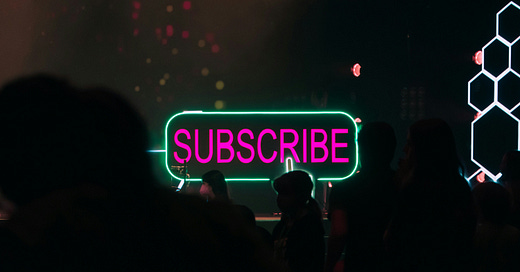“Paid subscribers have a special place in my heart,” I wrote recently as a caption to the upgrade button of my newsletter. One reader found this sentence “worrisome” and then added, as a response to my vain attempts to explain myself, that it sounded “abusive” to phrase my appreciation this way.
That word—abusive—landed heavily. As someone who experienced serious childhood abuse, it tapped into that persistent, unspoken fear many survivors carry—that somehow, despite our vigilance and healing work, we might inadvertently replicate patterns of harm. That in some fundamental way, we are tainted. A simple sentence had suddenly become loaded with unexpected weight. So I didn’t take this criticism lightly and reflected on whether she was, in fact, right.
I realised that this interaction exposed our collective unease with digital economics—the awkwardness of monetizing emails. A discomfort that extends far beyond this particular email exchange.
By transforming our inboxes into marketplaces, platforms like Substack create tension between purpose and payment, intimacy and commerce—between “I'm here because I care” and “I still need to earn a living.” These tensions reveal shifting financial relationships, because when readers pay writers directly, they bypass media conglomerates, tech platforms, and advertising ecosystems (though platforms like Substack and Patreon still take their cut). The creator economy’s direct-to-consumer approach undermines corporate consolidation by building a network of sustainable livelihoods outside traditional employment, where value flows between individuals rather than being extracted by distant shareholders.
Yet this mutual support system remains shrouded in awkwardness and apology.
For writers, especially those who built audiences through free social media, the transition to asking for payment feels like inviting friends over for dinner and then quietly suggesting they leave cash on the kitchen table before they go. It’s awkward. And when what you offer is grounded in soul work—writing, healing, storytelling, activism—this shift can feel like betrayal.
Unlike one-time transactions like buying a book or a ticket, subscriptions imply continuity and create an ongoing relationship marked by periodic reminders that this relationship has a price tag. Every “upgrade now” button, every paywall is a tiny moment of social friction.
This friction becomes even more acute for those of us engaged in social change. There’s a peculiar expectation that if you critique capitalism, you should somehow transcend it personally. That those fighting systemic inequalities should somehow exist outside the systems they critique.
The activist who charges for their knowledge faces accusations of hypocrisy, as if anticapitalist sentiment must be expressed exclusively through personal poverty.
“How can you critique capitalism while participating in it?” goes the tired refrain, ignoring the fact that participation isn’t optional for those who enjoy eating and having shelter. This critique is selectively applied—rarely directed at white male intellectuals who command five-figure speaking fees while discussing inequality, but quickly aimed at marginalized voices who dare to monetize their perspectives.
And the underlying message is clear: certain bodies are allowed to receive compensation for their intellectual and creative labor, while others are not. Certain kinds of labor are seen as intellectual, while others are expected to share their insights for free, lest they compromise their moral authority.
What’s often lost in these conversations is that money isn’t just currency. When readers pay for content, they’re not just transferring funds; they’re communicating value. They’re saying: “This matters enough to me that I’m willing to sacrifice other potential purchases.”
Money, in this context, is a form of attention with stakes. Anyone can click “like,” but opening one’s wallet requires a different level of commitment.
In a creator-to-consumer economy based on mutual support, these transactions take on additional meaning. They become tiny acts of resistance against corporate dominance, small votes for the kind of media ecosystem we want to build.
Each subscription represents a conscious choice to direct resources toward individual creators rather than faceless conglomerates.
Maybe it’s time we stop trying to solve this dilemma with binaries. It’s not: either you care for social justice or you care about money. It’s not: either you’re pure in your politics or you’re complicit. Life is more nuanced than that. We’re all navigating this messy, late-capitalist terrain with as much integrity as we can muster.
Yes, I write because I feel called to. Because something in me needs to speak, to share, to connect. And yes, I need to live. To rest. To buy groceries and fund the quiet spaces that make this work possible.
The writer who acknowledges their paid subscribers isn’t necessarily commodifying their relationship with readers—they’re recognizing the concrete support that allows their work to continue. In a world where attention is increasingly scarce and fragmented but living expenses remain stubbornly concrete, financial support is a meaningful expression of value.
So when I say “paid subscribers have a special place in my heart”, I’m not glorifying money. I’m honoring the reality that support—both energetic and financial—is what allows this path to be sustainable.
What If We Reimagined the Whole Thing?
(putting a paywall here, and trying to not feel awkward.)
Keep reading with a 7-day free trial
Subscribe to The Big Shift - by Emilia Roig to keep reading this post and get 7 days of free access to the full post archives.





